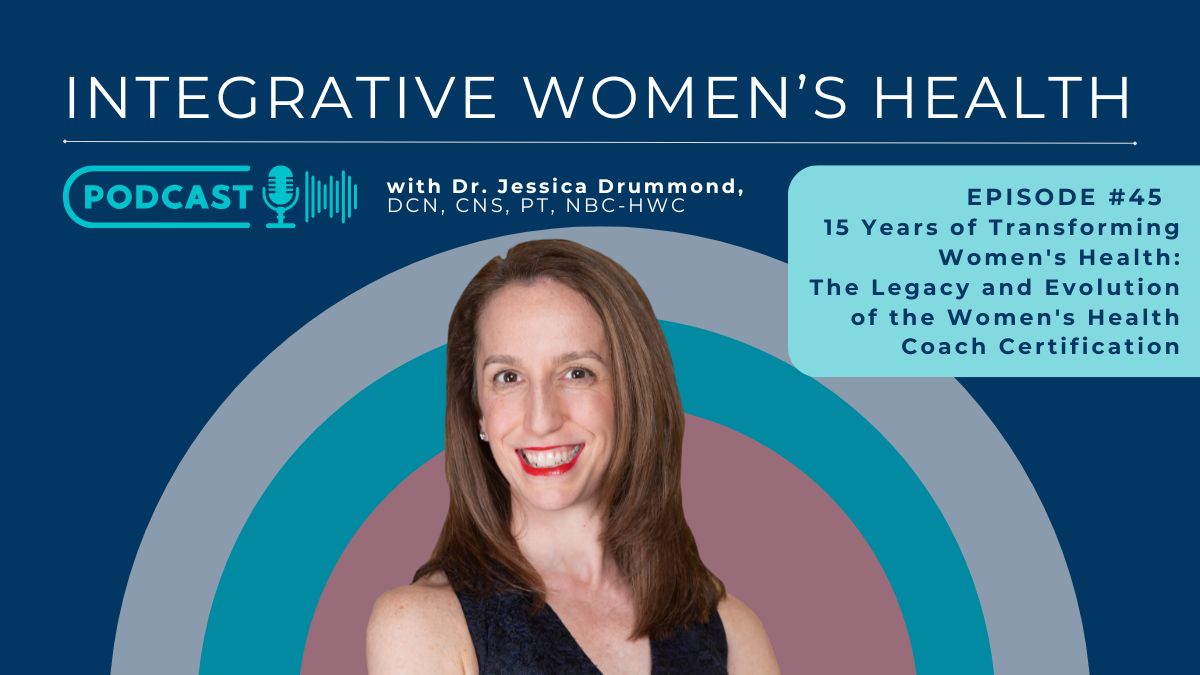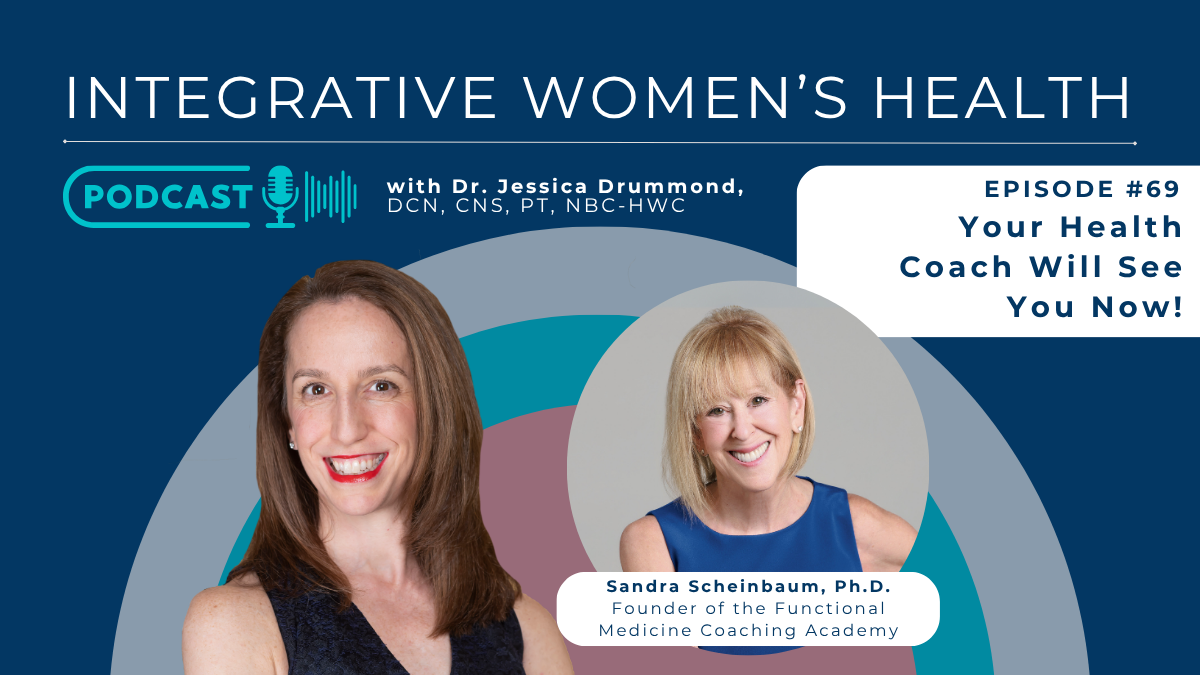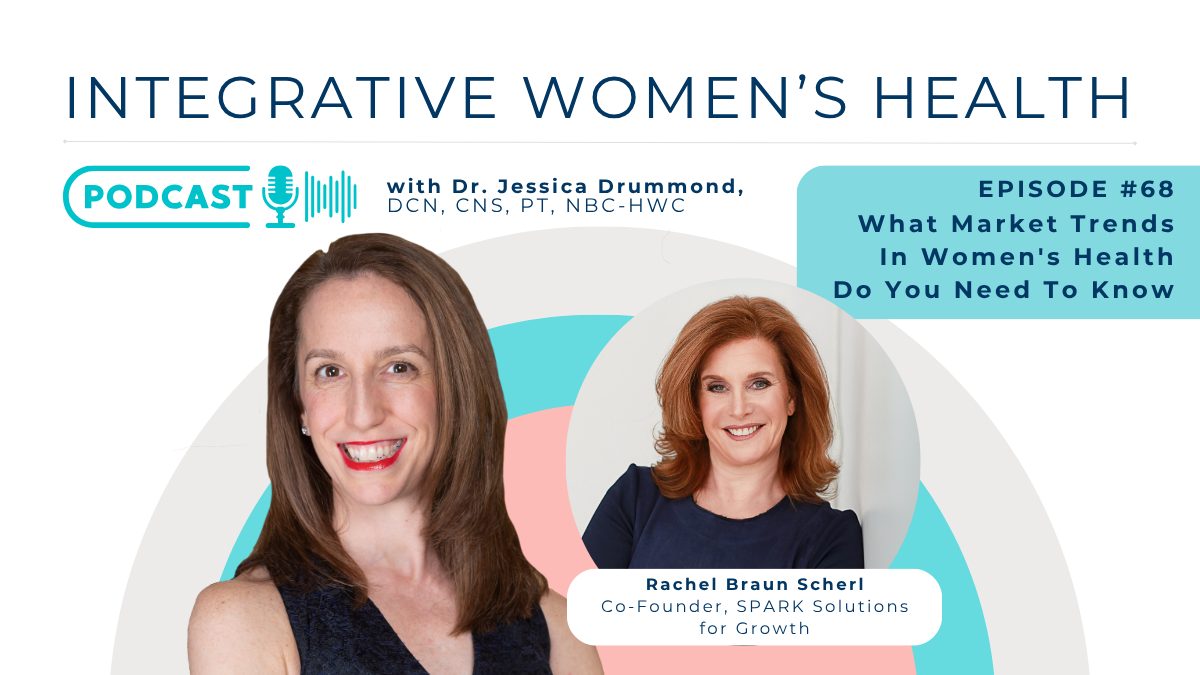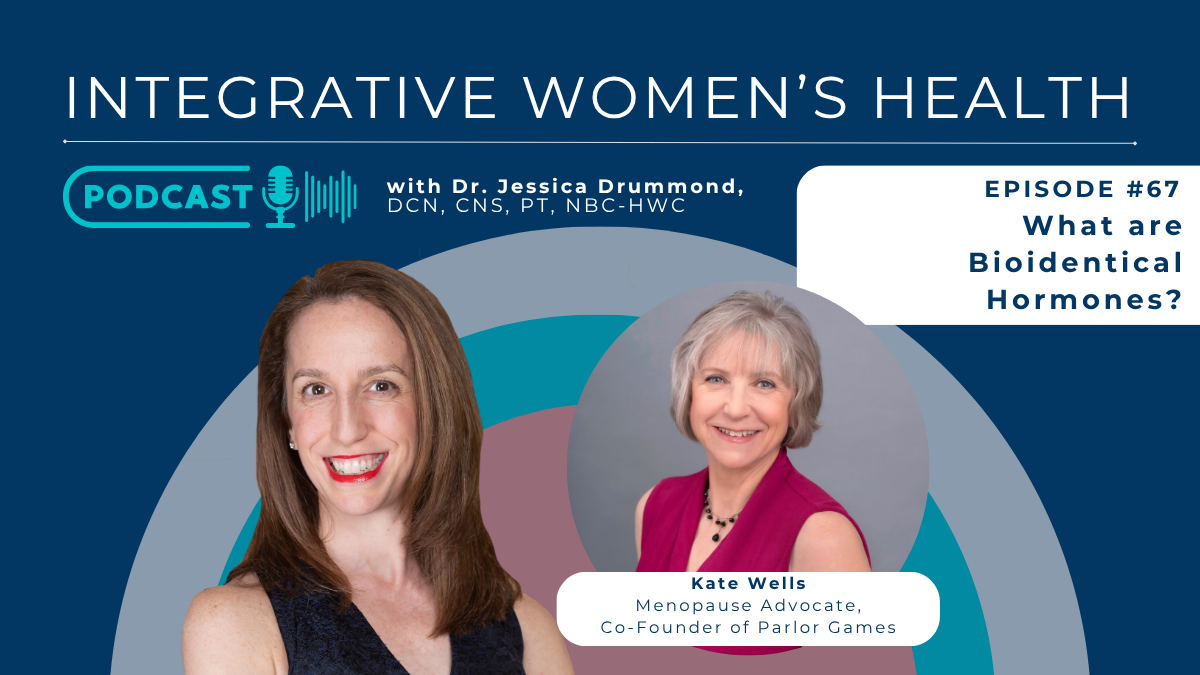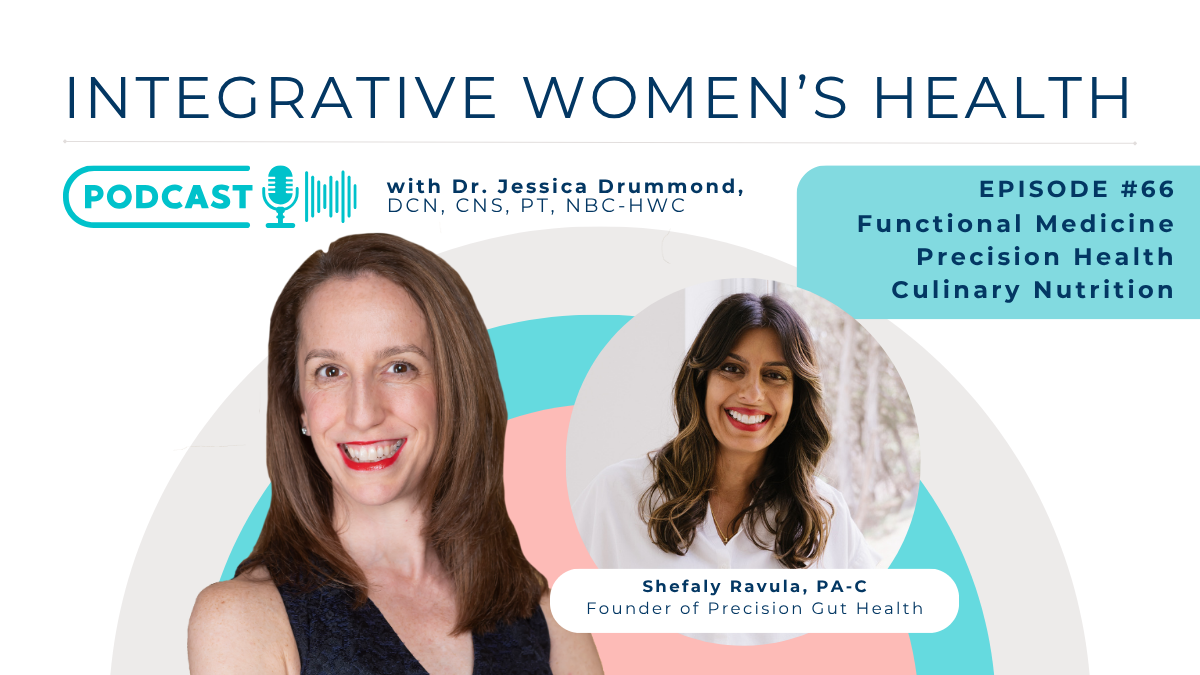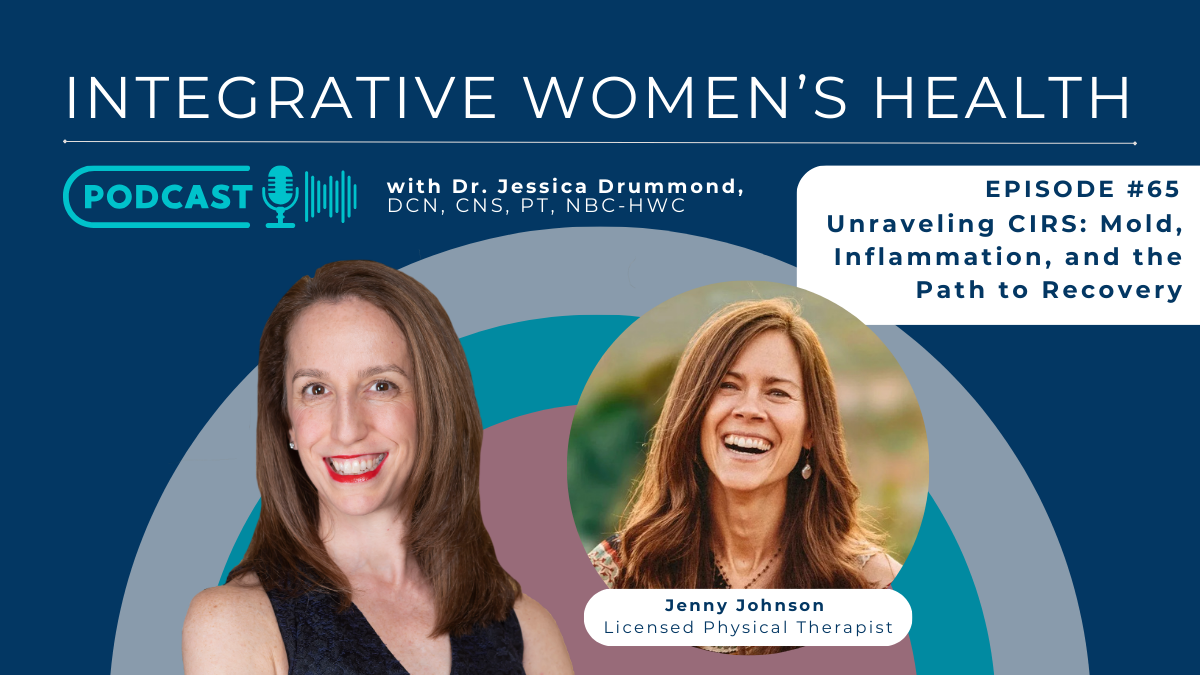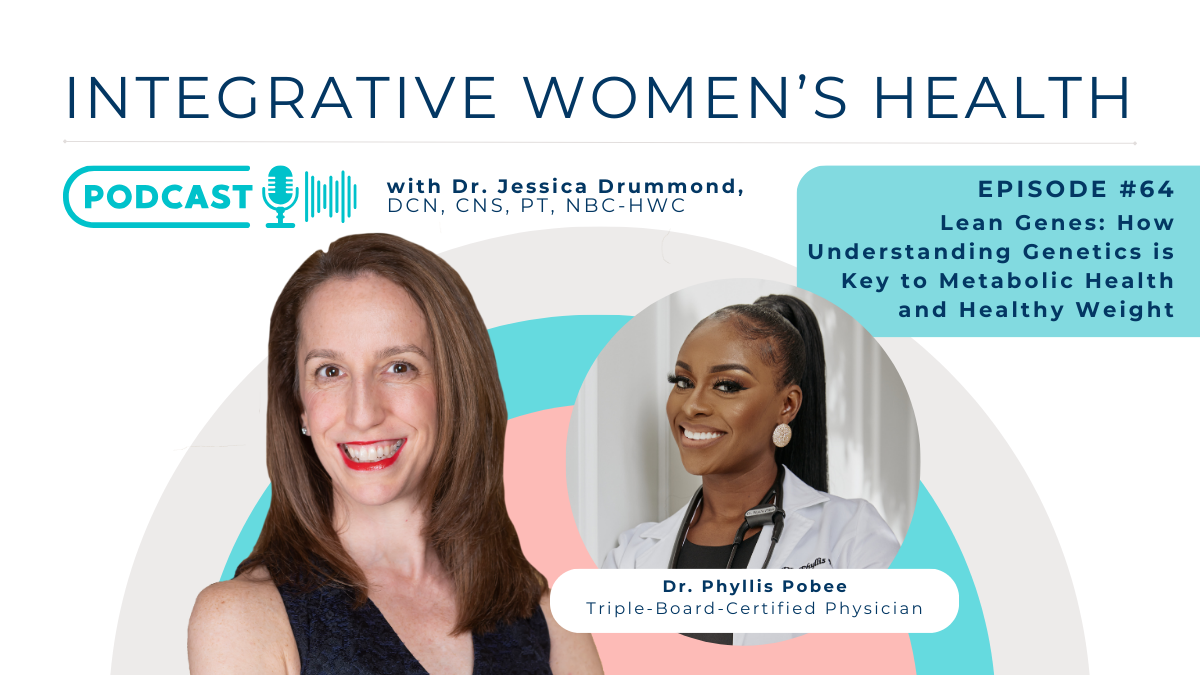Follow Us for Free:
About the episode
The role of health professionals has had to shift significantly over the past 20 years.
Patients have more tools than ever, from functional nutrition and lifestyle medicine to cutting-edge medical interventions and alternative therapies. Yet, even for those with access, it can be extremely difficult to navigate these resources and implement them sustainably over time.
That’s where health coaching plays a crucial role. It’s a set of communication skills that enables health and wellness professionals to guide people through the complexities of caring for themselves in an increasingly and acceleratingly complex and environmentally toxic world. I started to see this increasing need back in 2006, and that’s when I created the first iteration of the Women’s Health Coach certification program.
Today, I’m telling you how the Integrative Women’s Health Institute came into being and why I developed our flagship program, the Women’s Health Coach certification. I’m also sharing why this cohort will be the final one of the program and the exciting changes we have on the horizon.
Enjoy the episode, and let’s innovate and integrate together!
Highlights
- My experience as a new mother facing health challenges and navigating the healthcare system
- The crucial role of nutrition and nervous system regulation in my healing process
- How I began integrating nutrition and lifestyle medicine into my practice
- Why we need to help our clients create a holistic approach to their health
- The creation of the Women’s Health Coach Certification
- Community support and collaboration among women’s health professionals
- How I was able to land so many speaking engagements around the world
- The expansion of the Women’s Health Coach Certification
- What I recognized from the impact of mindful listening in my live sessions
- The decision to expand the certification to a digital format
- Focusing on women’s health within a patriarchal healthcare system.
- Expanding access to women’s health coaching and the role of health coaches
- The importance of self-reflection and vision
- The future of the Women’s Health Coach Certification
- Why it’s essential to evolve and adapt to the modern health coaching landscape
Ready to revolutionize your career and grow your practice?
- What is the next step in your career in women’s health and wellness? Start here: https://integrativewomenshealthinstitute.com/start-here/
- Integrative Women’s Health Institute on Instagram | @integrativewomenshealth
- Integrative Women’s Health Institute on YouTube
Learn more about The Integrative Women’s Health Institute’s Programs.
Click here for a full transcript of the episode.
Dr. Jessica Drummond 00:00:03 Hi and welcome to the Integrative Women’s Health Podcast. I’m your host, Doctor Jessica Drummond, and I am so thrilled to have you here as we dive into today’s episode. As always, innovating and integrating in the world of women’s health. And just as a reminder, the content in this podcast episode is no substitute for medical advice, diagnosis, or treatment from your medical or licensed health care team. While myself and many of my guests are licensed healthcare professionals, we are not your licensed healthcare professionals, so you want to get advice on your unique circumstances. Diagnostic recommendations treatment recommendations from your home medical team. Enjoy the episode. Let’s innovate and integrate together. Hi and welcome back to a very special episode of the Integrative Women’s Health Podcast. I’m your host, Doctor Jessica Drummond, founder and CEO of the Integrative Women’s Health Institute. Today I’m going to tell you a story, a story about really how the Institute came into being and about our flagship program, the Women’s Health Coach Certification. It has now been going on for over 15 years.
Dr. Jessica Drummond 00:01:34 And this cohort, we will be celebrating the 15 year anniversary. And actually, by the time this class graduates, it will truly be 20 years from when I very first started doing this work back in 2006. So I want to tell you that story because this cohort, the class that will be enrolling between now and February of 2025, will be the final cohort of the Women’s Health Coach certification, and then that program will be over. But we have some really exciting things on the horizon, because we’ve started to see a really important shift in the marketplace that I’m going to tell you about a little bit later. All right. So where did the Integrative Women’s Health Institute and specifically the Women’s Health Coach certification begin? So my oldest daughter was born in the fall of 2003. And I, like most new moms, had a period of Austin that because she wasn’t a great sleeper and I was brand new to all of this and but then I just kept getting sicker and sicker. I was so exhausted. I was fatigued.
Dr. Jessica Drummond 00:03:08 I had a lot of anxiety, which later I came to understand was dis autonomia. I had a lot of kind of dizziness and unable to sustain my blood pressure and all of these kind of vague and complicated symptoms. I got sick all the time. And so for about three years I really struggled to navigate the health system. Being a new mom. Right. Because if you’re sick as a new mom, they’re just like, well, it’s because you’re postpartum, you’re tired, you’re sleep deprived, you have a new baby, right? That’s always the answer. But that wasn’t the answer. What was most likely the answer, which I didn’t know at the time and really didn’t understand for at least three years when I started to get appropriate treatment, but really more like five years later when I started to dive more deeply into this work, it’s very likely I had a reactivation of the Epstein-Barr virus. I had had mono a couple of times in high school and college, and I was that level of deep fatigued, which also some new moms can be right, like sleep deprivation of new motherhood is no joke in and of itself.
Dr. Jessica Drummond 00:04:22 But what happened for me then was I began to understand that lifestyle, things like nutrition, which completely changed for me in that moment. If you knew me in physical therapy graduate school, where I graduated from in 1999, with the focus and expectation that I would be going into sports medicine, my one roommate, Katherine Anne, was a brilliant cook and I was not. You know, I didn’t eat badly in the sense that I wasn’t like a fast food girl. But the thing that I would contribute to our politics was slice and bake cookies. So that’s how much I was not a good cook and didn’t really know how to cook. My husband used to say, our first date I made him burnt hot dogs, which is possible. So while I was always fit, exercise and athlete, I just kind of ate whatever and I didn’t really have any insight into the importance of nutrient dense whole foods diet. But more and more, I didn’t have any understanding about the importance of nervous system regulation. That became more and more important as I was now deep into the first decade of my physical therapy career, and I worked with a lot of women with complex chronic pain.
Dr. Jessica Drummond 00:05:43 So I was a pelvic health specialist, orthopedic specialist, and I work with pregnant women, postpartum women, women with breast cancer, all kinds of complex symptoms. And so what I realized in that moment in right around 2006 was that the things I had learned to help myself heal a completely revised relationship with exercise, with stress and understanding of mindfulness, new understanding of nutrition, these tools could be brought back to my work with my clients in complex chronic pain who were not doing well. We had some tools in physical therapy at the time which were very, very helpful, but many of our clients at that time had no access to good quality endometriosis excision surgery. The core treatments were basically DNA agonists or opioids, and so many of them were addicted to opioids. They had nerve stimulators. It was not a good time in complex chronic pain endometriosis management. But as I began to help my clients shift their nutrition to change their lives, to be much, much more anti-inflammatory, and as their immune systems healed, as their neuroendocrine systems healed, they had much better improvement than we could get before.
Dr. Jessica Drummond 00:07:09 And I knew this worked because I had experienced it myself from being very, very sick to very, very well. So I started just telling everyone about this in my field of women’s and pelvic health, and a large community of physical therapists thought I was absolutely nuts. But a small and important community of women’s health providers, of women’s and pelvic health, physical therapists of my community from before that time and from people I met. And I’ll get to that in a minute. Supported me many therapists out in California Stephanie Prendergast, Karen Brandon, there’s going to be so many people that I leave off this important list. But Bella Kevlar check in in new Jersey. physical therapists up in Toronto, Michelle Lyons in Ireland later on, and most importantly, in the United Kingdom, Jenny Burrell, who I met later. So there are many, many people and I will not, unfortunately, remember to mention them all, but you know who you are. If you were on that list of early supporters and that made all the difference.
Dr. Jessica Drummond 00:08:22 So what I began to do in kind of 2006, 2007, 2008 is just start to talk about this idea of integrating nutrition as a part of the strategy for healing complex chronic illness, particularly complex chronic pelvic pain. And what came from that, which was so important is that I began to understand the difference between functional nutrition, which is what I was beginning to integrate into the practice, lifestyle medicine, which is about the day to day health behaviors of aligning with circadian and menstrual rhythms, aligning with seasonal rhythms, bedtime routines, morning routines, hydration. Like all these real foundational basics movement. Mobility. Walking. Spending more time outdoors and less time on devices. Ironically enough, as I share this on a podcast. But the reality was there were so much our clients had at their disposal from a nutrition standpoint, from a lifestyle medicine standpoint. And then how are we as women’s health and wellness professionals going to help our clients actually take these tools, both from nutrition and lifestyle medicine, but also physical therapy and medical interventions and nutritional supplement interventions.
Dr. Jessica Drummond 00:09:45 How could our clients take all of these recommendations and implement them consistently over time? The magic of that is health coaching. It’s a set of communication skills that helps health and wellness professionals help people to navigate the complexities of taking care of themselves in an increasingly and exhilaratingly difficult and, quite frankly, environmentally toxic world. Right? We now, even back from 2006, have far more environmental toxins in the environment, have new viruses, have changes related to climate change, have new stressors such as, you know, I didn’t even have a cell phone in 2006, 2008. Right. Emfs. And just being online and the algorithmic nature of our conversations, right? So everything is getting more and more complex, more and more stressful. And I mean that from a physiologic standpoint. And so the role of health professionals has to shift. And I could see that even back then. So I created the first iteration of the Women’s Health Coach certification. And I was working at the time at the Women’s Hospital of Texas with under a Fatimah Hakim, who was one of the early pioneers in women’s and pelvic health and physical therapy.
Dr. Jessica Drummond 00:11:13 And she really was always kind of on the leading edge. She was always pioneering, always innovating, innovating. And she invited me to do a three day course, which was the first iteration might have been even a little longer, four days of a live course training my colleagues who were open to these new ideas in using nutrition and mindfulness and health coaching communication skills to get our clients to be able to take better care of themselves and literally lower their physiologic inflammation. And I’ve seen over the years many even more powerful stories of really healing root causes of complex chronic illnesses. Having endometriosis either stop progressing or become completely symptom free over time, and many other dysfunctions hormonal imbalances being completely corrected. Very healthy transitions from postpartum into perimenopause and menopause. Reversing chronic infectious or post infectious symptoms and syndromes. This is powerful, powerful medicine. But it started there. And it started with the willingness of, I don’t know, 50 pelvic and women’s health physical therapists, with the encouragement of Fatima Hakim, to show up and learn and talk about how for women with complex chronic pain, some of the most important things are like what are their boundaries? Who’s helping them? Who’s on their team? Where is their village? How do they create a village in a world of individualism? Right.
Dr. Jessica Drummond 00:12:53 So it’s not just about which type of magnesium to take. It goes so much deeper than that. What’s the trauma history, how retraumatized our women being in the current health care system? Where are they finding safety in their bodies, in their friendship groups and their communities, in their families, in their health care experiences? And we started to have these very deep conversations. And then, as I mentioned, I began to be invited to speak or I just reached out. So I was telling this story to Jake on our team. She’s our operations and program manager assistant. And she was like, well, how did you get to go and speak at all of these places? Because basically from, I don’t know, 20 1112. So my, my next daughter, my youngest daughter was born in 2010. So the first few years were kind of figuring out what I was going to do, learning how to do things like network and do sales and marketing and record things to YouTube when you know cell phones didn’t exist.
Dr. Jessica Drummond 00:13:57 Setting up video studios in my house, moving around because my husband had a very busy consulting job from which he was often traveling, or we would travel with him. So it was a crazy time. I had little kids, I was pregnant, I was on bed rest for a while. I had a second little baby, but sometime around 2011 or 12, I decided to go all in on the Women’s Health Coach certification. I had also been coaching women this whole time, as I continue to do now, and I was integrating my clinical hats with my coaching hat, and I still do that in my small private practice, so if anyone needs support at that level of depth, we still offer that. Now though, in 2012 to about 2019, how was I invited to speak all over the world? And really it was about networking. It was about celebrating others who were being innovative like this, and it was literally about networking. Like I met Jennie Burrell, who was a brilliant fitness instructor and coaching instructor and has her own educational company in London at the time, and now she’s digital and global, but she lives outside of London, and we met in a Facebook group and we had a couple of zoom calls or wasn’t even zoom at the time.
Dr. Jessica Drummond 00:15:21 I don’t remember whatever the software was. We have a couple of video calls, and she invited me to come speak at her conference and stay at her house. And so and that might have even been I was going to say that was my first time in London, but actually, no, it was my second time. I went once when I was a teenager to visit some family friends, but I was not a global traveler on a regular basis until that decade or so of my life, because it simply wasn’t part of my upbringing to be traveling all the time. So that was a wonderful time. And how we spread the word about the Women’s Health Coach certification and how we grew. It was literally traveling the world, and I had a lot of support from my early team. The person who really was by my side for many, many years, probably more than a decade, to really build the foundations of the women’s health coach certification was Nadia Lancaster, and she sometimes came. I also worked with Laura Ritchie for a while.
Dr. Jessica Drummond 00:16:26 She would come and support me on some of these trips. Sometimes I would do them myself. Sometimes I would bring my family, Sometimes I would be paid and invited. Other times I would hustle and show up. It took about three years, maybe five years, before any of my talks were accepted at the Apta combine sections meeting, and then somebody canceled. So they were like, fine, let this person talk. She’s, you know, she’s been begging us for many years and it all went very well. So then we had this larger and larger support of the physical therapy community of the women’s and pelvic health physical therapy community, in particular, occupational therapists, nutritionists, other health coaches who are interested in some specialization in women’s health. And there was just a hunger for this when I would do these live trainings, we always sat and did a practice exercise of mindful listening, and I cannot think of one experience in the journey of those years where I was traveling at least once or twice a month, most of the year, anywhere in the world, Australia, China, all over Europe, parts of Canada, all over the United States.
Dr. Jessica Drummond 00:17:44 And I can’t remember one time where we did the mindfulness and holding space exercise, where there were not tears in the room. And the feedback of those live experiences is what helped me to develop the digital version of this course, because I knew in person how it affected women and how much pain people were holding about their healing experiences, and about their navigation through a broken and imperfect health system and life and world. And I knew right there that if women’s health and wellness professionals could be educated to safely hold that space for themselves, for each other, and for their patients and clients. That would be how we would revolutionize the health care system and women’s health in particular, and we would find our voices again to be able to advocate for more and more research, to be able to hold the payers and the clinical guidelines people, to really fight for women to get equal access to treatment, to have more research done, more funding and more just support of things that work for pain, whether they were profitable or not.
Dr. Jessica Drummond 00:19:15 So all kinds of pain, emotional pain, fatigue, physical pain, headaches, you know, neurologic pain, chronic pain, pain related hormonal shifts, emotional pain, mental pain, cognitive pain, all kinds of pain that women carry at huge burdens. The percentage of women with even autoimmune disease right now is something close to 80%. This is accelerating and getting worse because of the changes in our environment. And so we had to find a way to use communication skills to help women change, not just to like, take a medication consistently, but to understand the contributors in her past and her current life and her environment, to her deeper health challenges. And those communication skills are coaching. And then you combine that with lifestyle medicine, with functional nutrition, with clinical medicine, working on teams with nutritionists and dietitians and physical and occupational therapists and Pas and nurse practitioners and physicians and surgeons. Then you have the community that women need to heal, not just in their own lives, but in the health system. And then we began to expand to do more group coaching, more specialized coaching.
Dr. Jessica Drummond 00:20:41 So that was really the catalyst was seeing how in real life, in real time mindful listening, holding space and powerful questions and some of the other health coaching communication tools like reflections, metaphor, journaling, visioning, goal setting, reviewing. Why was someone able to overcome a barrier to change, and why aren’t they going deep like that has changed how we provide care such that it’s better received. And it was so exciting to me to see that in real time. So sometime around and again the dates. I’m just not someone who, like, writes all this stuff down. I just went with the flow. So probably around let’s say 2011. I began to work with online business training coaches, including a community with JJ Virgin, Fabian Frederickson. There were a number of early business coaches who taught me how to build this education, and it was clear to me even in 2011, but definitely by 2018, that traveling twice a month all over the world was not going to be sustainable. And then of course, in 2020, we couldn’t do that.
Dr. Jessica Drummond 00:22:09 So sometime around 2011, 2012, I began to build the first digital iteration of the Women’s Health Coach certification online. Now we could reach women all over the world. And this accelerated quickly in a way that shocked me. I remember I was on like a Metro-North train. I was living in Connecticut and going to the city for some reason, and a woman enrolled in the course from, I believe it was like Romania or something like that. It was a country that was kind of off my radar and traveled there. We weren’t doing focused marketing there, and she had sent me the most kind email about how this kind of thing is just not available where she is, and she can’t wait to be the pioneer in her area. And it grew to well over 60 countries when we stopped counting, and we now have well over 3000 coaches around the world who have been educated in these methods. And that happened because of the power of the internet and social media, and why there is a lot of downsides to all of that.
Dr. Jessica Drummond 00:23:14 It allowed us to expand this wisdom in this knowledge and really double down on focusing on women’s health, and I felt really strongly about that because I felt like in medicine it is a patriarchal system. It was built as a patriarchal system. And so there was a lot of misogyny and there’s very little direction of research funding. I think the data, even today, after a huge grant and funding through the Department of Defense for endometriosis, is a statistic I read the other day, there’s still only $2 per year per woman who has endometriosis of research funding. I mean, that is abysmal. So I stayed focused on women’s health because I really felt like we had to look at the literature, the research about nutrition, lifestyle medicine, behavior change and the clinical tools through the lens of the research that we had. Even if it was done on males, could it reasonably extrapolated to females or not? And sometimes it is without really critically reviewing if it should be extrapolated from men to women. So that was where I stayed focused.
Dr. Jessica Drummond 00:24:22 And I’m certainly have over the years expanded that flexibility to women’s health, pelvic health, male pelvic health, health for transgender people. I am very flexible with how this information is used, and I think the more the better, the more flexibly the better, the more inclusively the better, because there are subpopulations of women who have things even worse. We know, for example, that the maternal death rate in black women in certain communities is 12 times higher than that of white women. So we have a lot of work to do even now. But through the support of multiple communities of digital health and wellness professionals and experts and, well, you know, health influencers have a bad name. And some of them, quite frankly, should. There are actually some really skillful health influencers who are more and more and more joining us in digitizing and expanding this skillful toolkit to anywhere in the world. And I was just doing a podcast yesterday, recording it with Doctor Kerri Pagano, and she was reminding me that the number one social determinant of any woman’s health care is her zip code.
Dr. Jessica Drummond 00:25:41 So where you are born matters more than anything else to how healthy you will be and then where you live. And so if you do not have access to these kinds of opportunities to health coaching, to health coaching groups with people who understand what you’re going through with other women in your shoes, with skillful providers, that is a huge disadvantage. And we are trying to spread this to every zip code in the world so that more and more women have this access, have done a lot of that through the work of you and our community and our teams over the years. You know, I mentioned Nadia, who really helped me build this from the ground up and many of our earliest health coaches. Now we have a whole team of health coaches Susan, Kathy, Liz, nausea, Cindy, Leslie. I mean, our health coaches are amazing, and they have now taken the Women’s Health Coach certification and really run with it. They do most of the work and they have expanded the retreats, which is always our most popular thing.
Dr. Jessica Drummond 00:26:55 People think they’re not going to have time to spend a weekend or two paying attention to their coaching skills and learning them live online, and then they come out of it and they’re like, can I do that again? It’s so deep to look at. And Liz does this really well. Susan does this really well. Kathy does this really well. Pauline so mindful. Naja is like me. She brings the fire of just tough love in the sense of we have to hold ourselves to a really high standard. Cindy. So peaceful. And I think that when we meet all of the health coaches and they begin to talk about challenges like barriers to change, boundaries issues, and women feeling like they’re lost, they don’t even have a vision. So the Women’s Health Coach certification, first and foremost, is for the woman going through the program. It’s for you. It’s for you to turn the mirror on yourself and say, what is my vision? How am I taking care of myself? What support should I start to ask for? What would benefit me? What do I need? What more love can I receive? What more help can I ask for? What more focus can I give to my work? How much more present can I be? And doing that in a community of other people just like you.
Dr. Jessica Drummond 00:28:26 It’s so fun and empowering. And like I said, our coaches have taken this work deeper and to a more advanced level over the years. So what I’m so excited about as we welcome in this final cohort of the Women’s Health Coach certification, is the huge ripple effect of the number of lives of women we have touched through those 3000 plus graduates and through you. As you join our final cohort, you are entering a community of women who have literally changed women’s healthcare from something that everyone thought was crazy less than 20 years ago to it being much, much more mainstream. Which brings me to why we are closing the doors for good to the Women’s Health Coach certification after February of 2025. It’s because it’s time for us to go even deeper. Our community is an advanced community in this skill set, and we are focusing on sub specialization in perimenopause, menopause, longevity, endometriosis and complex chronic pain. We are taking all of this to a next level of finishing, and we have a really expansive and dramatically and quickly growing membership program that gives people access to deep dive master classes in women’s and pelvic health.
Dr. Jessica Drummond 00:30:04 And what we are seeing is our students are at a level where it’s time for us to uplevel, literally take it to the next level and help our community navigate their own perimenopause and menopause journeys, navigate their own endometriosis and chronic pelvic pain and chronic illness journeys. First turning the mirror on themselves. We’re still doing that and taking it deeper, more specific. Because here’s the way that the world is going. We are in an algorithmic world. Marketing is aligned with very small niches because of how marketing has evolved. Like I said, when this all started, I didn’t even have a cell phone. Marketing was literally me getting on a plane and talking to anywhere from 20 to 2000 people at a time. And it was a hustle, but it was a lot of fun because I got to touch all of those people in real time, and they gave me direct and immediate feedback. We still get that, but in a very different way. Now it’s through the algorithmic touching of people who are specifically interested in certain things.
Dr. Jessica Drummond 00:31:13 So our women’s health coach graduates are ready for that next level. And they have done the deep, deep work of learning these coaching skills in their bones. So if you want the ability to be like a top 1% health coach, you want to do this program right now before it closes, because this is your last opportunity to go deep, deep, deep and be excellent and get mentoring from master coaches of all stripes. Our Master Coach team is the best there is. They are skilled, they are experienced, they are clinicians, they are non clinicians. They have it all. And they are really, really good at teaching. They’re not just phoning it in. They’ve been doing this most of them for more than a decade. So you want that one on one mentorship from them and from me. I still teach one hour a week every single week in this program. Not to mention we do our visioning retreats every quarter, which I mean, you need to know your own vision, right? What’s going on? What’s what are you doing? As as Mary Oliver said, with this one wild and crazy life.
Dr. Jessica Drummond 00:32:27 What are you doing? It’s time to take a moment and create that vision so that you can actually achieve it. So much is available to us through all of these modern communication systems, but we have to understand how to use them. And you want to be a part of this community because there are a few things I’m not going to tell you about today. You’ll hear about them soon enough. But our community is expanding in ways that are going to be ahead of the curve, just like we were ahead of the curve in telehealth, just like we were ahead of the curve 20 years ago in health coaching. Just like we’re ahead of the curve now in longevity. Perimenopause and menopause and chronic illness. This community is dynamic. It’s global. It’s multidisciplinary. And we love welcoming new people in who match our level of excitement, vulnerability, confusion, questioning. Sometimes we don’t know what we’re doing right. I built a lot of this airplane while I was flying it. So you want business advice from people who have made a lot of mistakes.
Dr. Jessica Drummond 00:33:41 So I’ve had these awesome supporters. I’ve had these awesome team members. Right now we’ve got Don, we’ve got Derek, we’ve got JC, we’ve got our sales team. Brandi and Kelsey, who are specialists at career coaching. We’re not a numbers game program. We are a right fit career coaching program. We want what’s best for you, and this is why we have decided to shift away from this area. The way the changes are going at some of our oversight organizations, it’s supportive of large organizations with a lot of churn. Get people in without really stopping and sitting with them. When you meet with Brandi or Kelsey, you are going to get to figure out if this is the right next step for you. This is not about us hitting sales goals. We don’t have hundreds of thousands of graduates. That is for a very specific reason. We want people who are all in, who are coachable, who are ready, and who have the skill set to be successful. Pretty soon, in a couple of weeks, I’m going to release the next episode in this series where I’m going to talk to you about whether or not.
Dr. Jessica Drummond 00:35:01 Women’s health coaching is the right career for you and we’ll talk about who is a good fit and those are the people we want. It’s likely you. So if you’re even curious, like, maybe this is for me, should I join this before it’s too late? Probably, yes. At minimum, you should have a conversation with Brandi and or Kelsey. Our career coaching specialists are not about changing your mind, convincing you to do anything. We are about seeing what is a right fit. Because this program, the Women’s Health Coach Certification, has two decades of legacy. And we have deep respect for our graduates, our current students, our current community. Many people who have graduated back in like 2012 are still very, very active in our community. In 2012, 2015, 2019, we have very, very active, multidisciplinary members, and I am deeply protective of our community. You are going to love it here. We are welcoming, we’re supportive, and we allow you to be your whole self.
Dr. Jessica Drummond 00:36:12 You can have vulnerable days. You can have rock star days. We’re going to celebrate it all. We’re going to help you navigate it all. You’re in good hands with this legacy of master coaches, students, graduates and people who are deeply committed in a multidisciplinary and multi perspective way on advancing and innovating in women’s health care. So think about joining us. Reach out to speak with Brandi and Kelsey on our team. I will make sure in the show notes you can just click a link and schedule with them. But if you’re hungry right now and you’re listening to this, just go to Integrative Women’s Health Institute. Com that’s integrative women’s health institute. Com and follow us on Instagram at Integrative Women’s Health. You can go to the link in bio to find out more about the Women’s Health Coach final cohort 2025. I’ll see you there. I’ll be mentoring you each and every week. Live. I can’t wait to meet you. See you next week. Thank you so much for joining me today for this episode of the Integrative Women’s Health Podcast.
Dr. Jessica Drummond 00:37:30 Please share this episode with a colleague and if you loved it, hit that subscribe or follow button on your favorite podcast streaming service so that we can do even more to make this podcast better for you and your clients. Let’s innovate and integrate in the world of women’s health.
Join Dr. Jessica Drummond to learn the three key steps to becoming a successful, board-certified Women’s Health Coach who leaves a lasting positive impact on their clients.
Learn how utilizing health coaching skills in your practice is crucial to your success, leaving a lasting impact on your clients, and shifting the paradigm of women’s healthcare.

Dr. Jessica Drummond
Founder & CEO
The Integrative Women’s Health Institute
At the Integrative Women’s Health Institute, we’ve dedicated 17 years to crafting evidence-driven, cutting-edge programs that empower practitioners like you to address the complexities of women’s health.
Dr. Jessica Drummond’s unique approach focuses on functional nutrition, lifestyle medicine, movement therapies, nervous system dysregulation, trauma, and mindset – essential elements often overlooked in traditional health education.
In addition, your training will be fully evidence based, personalized, and nuanced (this is not a cookie cutter approach) in functional nutrition, exercise, recovery, cellular health, and all other lifestyle medicine tools.
You’ll learn to support your clients with cutting edge tools safely and effectively.

